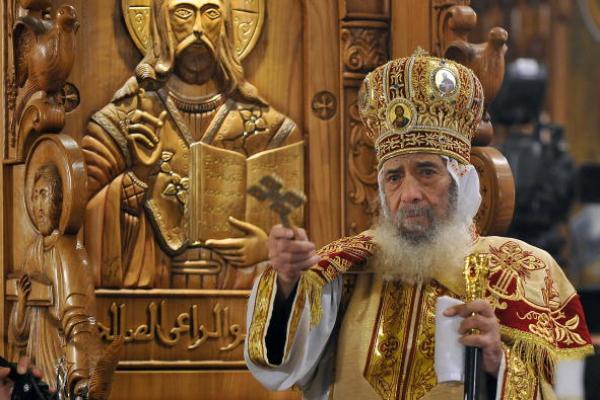The death of Pope Shenouda III, leader of the 10 million Coptic Christians centered in Egypt, comes at a critical time for this church, which makes up about 10 percent of the Egyptian population.
One can hope that the outpouring of regard and respect for this Christian leader from throughout Egyptian society can be an occasion for reconciliation, easing the rising tensions and suffering of this ancient Christian community. As hundreds of thousands have gathered to pray and mourn during these days, Muslims have been offering them water and sandwiches.
First, some words about the Coptic Orthodox Church. It’s off the radar for most American Christians, absorbed as we are in our religious parochialism, still thinking that we are at the center of the Christian world. The Coptic Church traces its origins to the Apostle Mark. They believe he was the one who journeyed as a missionary to their land, and founded their church.
Even more, this church treasures the visit of Mary, Joseph, and Jesus in their “flight to Egypt” to escape Herod’s persecution after the birth in Bethlehem. Depictions of this story in icons, statues, books and even pedestals for clocks are found everywhere in the church’s bookstores and shops. Holy places in their land are said to commemorate where the family visited during their sojourn in Egypt.
Pope Shenouda led what many would call a biblical and spiritual life — the heartbeat of this ancient church. He loved the Bible, studying it thoroughly, memorizing vast passages, and teaching classes on its content — something unusual in the practices of this liturgical church. After becoming Pope in 1971, for many years he would teach from the Bible on a weekday night (I think it was always Wednesday) in St. Mark’s Cathedral in Cairo. He would schedule his world travels to be back in time for these Bible studies. The cathedral would be packed, and Pope Shenouda would patiently answer the questions raised by those coming to listen and learn.
When I first met Pope Shenouda in 2004, I was general secretary of the Reformed Church in America, leading a denominational delegation to the Middle East. At the close of our “audience” — a time of rich conversation — I presented him with a small travel Bible which had been printed by the RCA. It was the NRSV translation. He took it gracefully, but immediately looked up a particular verse in the New Testament that was of concern, and promptly announced that the NRSV’s translation was inaccurate.
The Bible Society of Egypt, which loved Pope Shenouda’s biblical emphasis, is using the occasion of his funeral this week to reach out to the society. Pope Shenouda’s call to ministry came in 1945, when he read a passage from the Bible in the window of a bookstore of the Bible Society of Egypt. The organization has prepared a pamphlet summarizing his life and love of the Scriptures, and printed 1,000,000 copies for distribution.
Today’s funeral will provide a focus of national attention of the extraordinary life of this church leader.
Pope Shenouda also led the Coptic Orthodox Church in its proactive ecumenical commitments. He served as one of the regional presidents of the World Council of Churches from 1991 to 1998, and also was a president of the Middle East Council of Churches. The last occasion I had the privilege of meeting with him was when I was part of a delegation from the Global Christian Forum in 2009, visiting church leaders throughout the Middle East to explain its vision and purpose.
Pope Shenouda received us warmly and enthusiastically. He had a heart for church unity. And it was matched by his actions. Bishop Serapion, who heads much of the Coptic Orthodox church in the United States, has been a key supporter of Christian Churches Together in the USA, and the Global Christian Forum, with his pope’s blessing.
During his years of service, Pope Shenouda did have his detractors — particularly since the Arab Spring. Shenouda had to walk a fine line, being supportive of the Mubarak regime as he sought, in return, protection for his church as a minority in a predominantly Muslim society. It’s a dilemma faced by many churches in Middle Eastern societies today. As the amazing public pressures to end the regime mounted in Tahrir Square, younger Coptic Christians often were hand in hand with Muslim brothers and sisters. But older leaders were far more cautious.
The months since that the dawn of Arab Spring have brought instances of increased tension and persecution. At the CCT annual meeting in Memphis a few weeks ago, we watched a video of footage, brought by Coptic Orthodox members, telling stories of modern martyrdom.
Pope Shenouda was a leader in Christian-Muslim dialogue, and the hope is that this spirit might prevail as Egyptian society undergoes its political and social changes.
The funeral service today for Pope Shenouda III will reverberate throughout Egyptian society. His voice holding up the message of the Bible, and working humbly for justice and inter-religious reconciliation within his country, will be honored.
Let us pray that it also will be heeded.
Wesley Granberg-Michaelson is former General Secretary of the Reformed Church in America and author of the book Unexpected Destinations.
(Photo at bottom right of Granberg-Michaelson with Pope Shenouda III. Courtesy of the author.)
Got something to say about what you're reading? We value your feedback!
